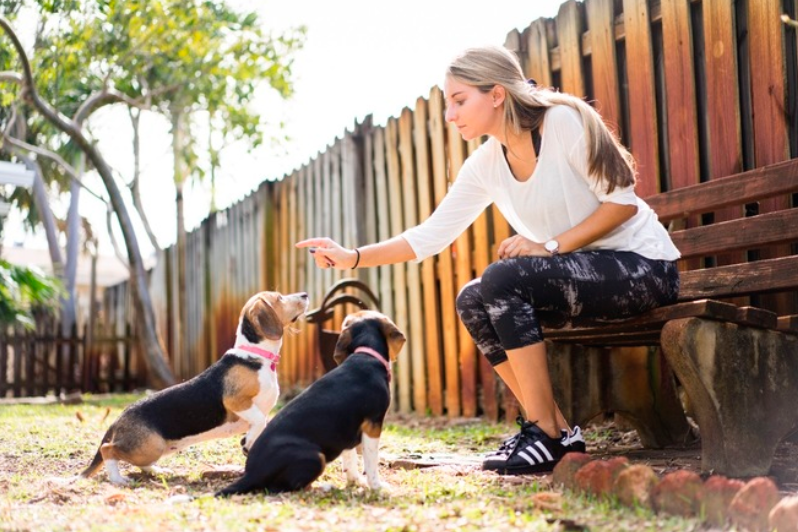Here’s the scenario: your pet recently began to do something really out of character. Maybe she started snapping at another household pet, or maybe he started to -gross!- eat his own poop. You know this calls for a professional’s input, but who can help? Should you bring in a pet trainer, or is this a case for a different kind of specialist known as an animal behaviorist? We’ll share the differences between the two pet pros so you can get the help you need.
Pet Trainers
Pet trainers are individuals who work to teach animals skills and change animal behaviors. These include actionable commands like “sit, stay, come” but also include situational behaviors – like teaching a dog not to jump on guests when they enter the home.
In addition to working with the dog, cat, horse, or other animal, trainers work with the pet owner to reinforce learnings. Trainers will provide direction to owners so that the skills can be practiced and perfected outside of the training environment. This “homework” helps teach owners to reinforce the learned behaviors, so it’s crucial that trainers are good communicators with humans, too!
Trainers can be self-taught, take animal behavior courses, or work with other trainers to learn their skill. What all good trainers have in common, though, are many hours of successful practice sessions with animal clients! Though there are a variety of training school offerings and certification courses, there is only one nationally recognized certification for dog trainers: the Certification Council for Professional Dog Trainers (CCPDT). To become certified, individuals must log a required amount of training hours, have letters of recommendation, and pass an evaluation on canine ethology (behavior), basic learning theory, and canine husbandry (a branch of agriculture that deals with breeding and raising domestic animals).
 How does an Animal Trainer work?
How does an Animal Trainer work?
Animal trainers will typically meet with your pet one on one, or in small group settings with other pets. Some trainers will seclude pets from their owners, while others work with both trainer and owner together so owners can actively reinforce from the beginning. There are also trainers and facilities that give you the option to board your animal for an extended period of time. This fully immerses them in the training environment, which can be more efficient for behaviors like high energy or aggression.
To teach pets, trainers will use methods like desensitization (repeatedly exposing pets to certain high-stimulation situations, like coming in contact with a unfamiliar person, in order to change their response), positive reinforcement (like providing a treat when an animal correctly responds to a command), clicker training (using a small clicker or other noise-maker while giving a command, so that the animal learns to take action by sound), hand signals (using a hand signal while giving a command so that the animal learns to take action by visual signal), and other tactics.
When to seek a Trainer
Working with a trainer is a great solution to teach your pet new skills or to improve obedience. Situations in which you might find a pet trainer to be helpful include housebreaking your pet; teaching commands such as sit, stay, come, heel, down, etc.; eliciting certain responses to your actions, i.e. dropping their toy at the sound of your snap; learning to walk on a leash without resistance; teaching boundaries, i.e. keeping your pet in your backyard (or off of your favorite sofa!); or even socializing your pet to become more comfortable around other animals. You can book a certified dog trainer on Petworks.
Animal Behaviorists
Like pet trainers, animal behaviorists dedicate their livelihoods to understanding animal behavior. However, behaviorists typically focus on the psychological motivation behind an animal’s actions and take many rigorous courses in psychology, communication, and behavior.
Those studying animal behavior may take the path of zoologist or even become a college professor, but many go on to specialize in small domestic and companion animals. Behaviorists who are experts in companion animal behavior come in 3 different categories: Applied Animal Behaviorists, Certified Applied Animal Behaviorists (CAABs) and Associate Certified Applied Animal Behaviorists (ACAABs). All of the above holds a Master’s Degree in an animal behavior-related field, while CAABs hold a doctoral degree.
 How does an Animal Behaviorist work?
How does an Animal Behaviorist work?
Behaviorists heavily study behavior modification, so they know the effective techniques to produce changes in behavior. They also know what is considered “normal behavior,” and can effectively recognize when your pet is acting out of the ordinary. To do so, many behaviorists begin by observing your pet in their natural environment. They pick up on environmental cues to help determine what might be triggering your pet’s actions. They then may begin to work one on one with your pet, emulating what they observed to try to mimic, and ultimately correct, the undesired actions. Like trainers, behaviorists also have experience with counseling and aiding people so they can teach how to understand and work with your pet. Most CAABs work through veterinary referrals, and can work with veterinarians to select behavioral medications should your pet require them.

Did you find this article useful? Would you like 100% free access to more articles like these, and free access to over 5,000 vetted pet care service professionals throughout the United States? Sign up here for a free Petworks account, and take 10% off your first booking, on us!
When to seek an Animal Behaviorist
If your pet’s actions are beyond basic obedience, it may be necessary to bring in a behaviorist. Some scenarios include handling issues, like extreme resistance to leashed walks; resource guarding, in which your pet aggressively “protects” food, toys, or even it’s owner!; excessive barking or meowing, sometimes without trigger; certain fears, like inanimate objects, sounds or actions; separation anxiety; serious behavior problems that put your pet, people or other animals at risk; or the aforementioned -gross!- eating poop. The best way to determine which professional you need for your pet is to connect with the professionals themselves! You can find an animal behaviorist on Petworks.
 In 2021, Dr. Marty Goldstein DVM joined the pet care platform Petworks as an advisor in its Animal Nutrition care division. Dr Marty Nature’s Blend is on a mission to help your pets live their healthiest lives possible. Dr. Marty’s pet nutrition expertise and guidance has helped Petworks evolve and become the preeminent animal and pet nutrition consultation service for pet parents in North America.
In 2021, Dr. Marty Goldstein DVM joined the pet care platform Petworks as an advisor in its Animal Nutrition care division. Dr Marty Nature’s Blend is on a mission to help your pets live their healthiest lives possible. Dr. Marty’s pet nutrition expertise and guidance has helped Petworks evolve and become the preeminent animal and pet nutrition consultation service for pet parents in North America.
 In 2022, Blue Buffalo Founder Bill Bishop Jr. joined Petworks as Senior Advisor in our Animal Nutrition Care Division. Bill brings his extensive expertise in pet food innovation and business leadership. His guidance helps Petworks enhance our pet nutrition service offerings, helping to ensure that pet parents throughout the world receive trusted, science-backed nutritional support for their dogs, cats, and animals.
In 2022, Blue Buffalo Founder Bill Bishop Jr. joined Petworks as Senior Advisor in our Animal Nutrition Care Division. Bill brings his extensive expertise in pet food innovation and business leadership. His guidance helps Petworks enhance our pet nutrition service offerings, helping to ensure that pet parents throughout the world receive trusted, science-backed nutritional support for their dogs, cats, and animals.
About The Author
 Petworks Co-Founder Kevin Kinyon is a life-long animal lover who works tirelessly to improve the lives of pets and their parents. Human and animal qualities he values most are integrity, humor, and empathy.
Petworks Co-Founder Kevin Kinyon is a life-long animal lover who works tirelessly to improve the lives of pets and their parents. Human and animal qualities he values most are integrity, humor, and empathy.



